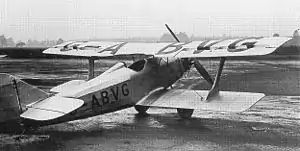| M.1 Satyr | |
|---|---|
 | |
| Role | Single-seat aerobatic biplane |
| Manufacturer | George Parnall and Company |
| Designer | Frederick George Miles |
| First flight | August 1932 |
| Status | Destroyed September 1936 |
| Primary user | Luxury Air Tours Limited |
| Number built | 1 |
The Miles M.1 Satyr was a 1930s British single-seat aerobatic biplane designed by F.G. Miles and built for him by George Parnall and Company.
Design and development
The Satyr was designed in 1932 by F.G. Miles. It was a wooden single-seat aerobatic biplane powered by a 75 hp Pobjoy R engine. The aircraft (registered G-ABVG) first flew in August 1932. Although the aircraft flew well Miles decided to concentrate on monoplane designs and only one was built. The only Satyr crashed in September 1936.
Specifications (M.1)
Data from Miles Aircraft Since 1925[1]
General characteristics
- Crew: One
- Length: 17 ft 8 in (5.38 m) [2]
- Wingspan: 21 ft 0 in (6.40 m)
- Wing area: 117 sq ft (10.9 m2)
- Empty weight: 594 lb (269 kg) [2]
- Gross weight: 900 lb (408 kg)
- Powerplant: 1 × Pobjoy R , 75 hp (56 kW)
Performance
- Maximum speed: 125 mph (201 km/h, 109 kn)
- Cruise speed: 110 mph (180 km/h, 96 kn)
- Rate of climb: 1,400 ft/min (7.1 m/s)
See also
There is film of the Satyr displaying at the British Hospitals Air Pageant at Cramlington Aerodrome, Northumberland on 12 August 1933.[3] The sequence starts at 9:07.
References
Wikimedia Commons has media related to Miles Satyr.
Notes
- ↑ Brown 1970, p. 55
- 1 2 Jackson 1988, p. 264
- ↑ "ACA News Reel Events of 1933". North East Film Archive. Yorkshire/North East Film Archive. Retrieved 16 February 2022.
Bibliography
- Amos, Peter. and Brown, Don Lambert. Miles Aircraft Since 1925. London: Putnam Aeronautical, 2000. ISBN 0-85177-787-2.
- Brown, Don L. (1970). Miles Aircraft Since 1925. London: Putnam & Company Ltd. ISBN 0-370-00127-3.
- The Illustrated Encyclopedia of Aircraft (Part Work 1982-1985). Orbis Publishing.
- Jackson, A. J. (1988). British Civil Aircraft 1919–1972: Volume 3. London: Putnam. ISBN 0-85177-818-6.
This article is issued from Wikipedia. The text is licensed under Creative Commons - Attribution - Sharealike. Additional terms may apply for the media files.